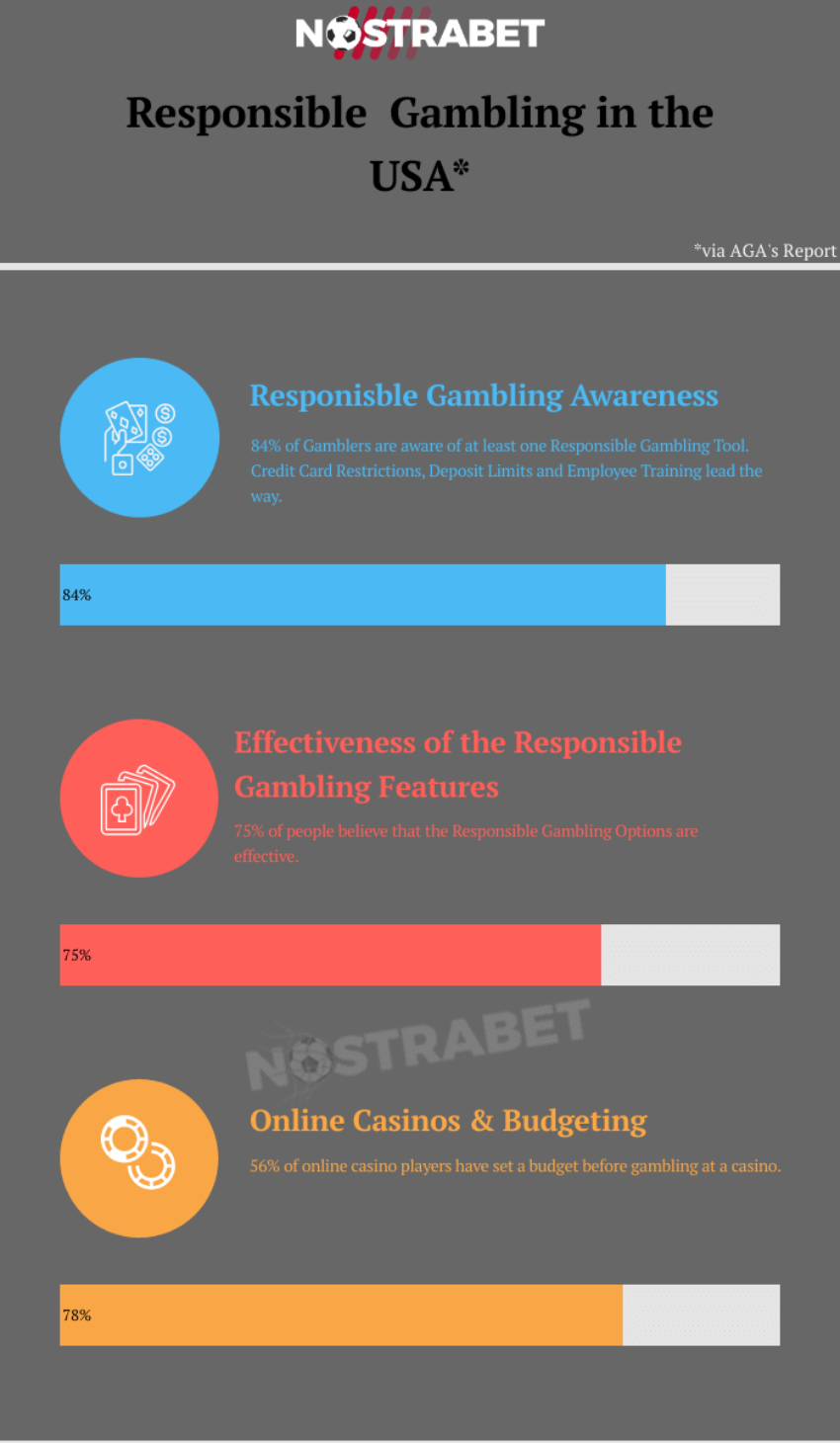
Responsible gambling has been an increasingly popular topic in all corners of the world, not just the U.S. Gambling regulators have become more demanding and require iGaming operators to offer at least a few options to their customers. As expected, most people did not appreciate the features, but the situation is slowly changing.
Based on a report from AGA, Nostrabet.com found that around 84% of American gamblers are aware that there are such responsible gambling features. This is an incredibly high percentage, indicating that most people interested in this activity are aware of how to stay safe.
Another impressive statistic is that 75% believe these responsible gambling measures work. It seems like most of them have used or are currently using some of the options and have realized that they are efficient.
Responsible gambling is essential because it protects players, maintains trust and promotes sustainability. As the iGaming industry continues to grow worldwide, commissions and companies will focus on providing even more tools to help users manage their spending effectively.

The report from the American Gaming Association contains several intriguing facts, so let’s analyze each one and see everything we need to know.
84% of U.S. Gamblers Know Responsible Gaming Tools Exist
We must say that AGA’s statistics somewhat shocked us. The fact that 84% of people are aware of different responsible gambling tools reveals a big leap forward from just a decade ago. Although we do not have specific statistics about that, we are confident that awareness was limited.
The surge in awareness reflects years of concerted education efforts. Gambling regulators, ads and even social media posts promote responsible gambling, so it seems like those things have an effect on players.
Having said that, awareness does not guarantee that everyone has responsible gambling behaviour. The fact that people know about those things does not mean that they are also using them. The real challenge is to translate that knowledge into consistent action.
75% Believe Responsible Gaming Tools Actually Work
It seems like awareness is not the only thing that is improving – trust is too. Based on AGA, 75% of people believe that responsible gambling tools are effective and help people control their behaviour.
- What’s very interesting is that the study includes stats about each of the most popular measures. Based on data, we can see that Credit Restrictions are leading with 91%, followed by Deposit Limits with 84%.
- Employee Training is next, with 83%, followed by Wager Limits, at 82%.
- Self-Exclusion Programs are next on the list with 80% and Reality Checks have 75%.
- Lastly, we have Time Limits, and 74% of people think it is effective.
These numbers paint a picture of growing public faith in each of these tools for responsible gambling. It seems that most people consider them as an empowerment that allows them to maintain enjoyment without harm, rather than as an interference.
We also want to emphasize that trust reflects a more transparent industry and culture. Operators focus on these features and provide different information about them, and how many people trust them. Some people appreciate the effort and increase their belief in the system.
How Many Gamblers Have a Gambling Budget and Stick To It
One way to avoid trouble when gambling is to set a budget. This is the simplest and most effective form of responsive play, and yet AGA reveals a gap in the intent and follow-through.
Interestingly, the behavior of players differs across formats.
- Physical casinos are leading the way because the stats show that around 80% of people “always” or “usually” set a budget before gambling. What’s even more impressive is that 90% of them “always” or “usually” adhere to it.
- Sports betting is next on the list because 60% of people always set a budget before gambling. Interestingly, 85% will also stick to it.
- Online casinos are last on the list because only 56% of players have a budget and 78% of them stick to it. It seems like some are disciplined, but others are fans of the “just one more bet” pattern.
The behaviour gap between different sectors reveals that awareness and attention don’t always lead to control. While budgeting is important, it is just one of the many things players need to consider. You also need to stick to the budget.
The Responsible Gaming Messages Are Resonating
The U.S. has one of the hottest gambling markets right now and AGA is putting a lot of effort into its campaigns to promote responsible gambling. One of those campaigns is called “Have a Game Plan: Bet Responsibly” and “Play Smart from the Start“, and it seems like they have reached millions of players.
- Around 87% of gamblers say that it’s essential for the gaming industry to promote responsible gambling and encourage it among clients.
- 85% of people seem to appreciate AGA’s effort in the “Play Smart from the Start” campaign. What’s also interesting is that 70-73% of Americans actually believe in each of the pillars behind this campaign. This includes “know the game you are playing”, “always act internationally” and “bring the right state of mind”.
What makes these campaigns successful is their consistency. Instead of moralizing, they focus on empowerment. Messages, such as to keep it fun, know your limits, and stay in control, appear during sports broadcasts, casino visits, and app logins. They reinforce the notion that responsible gaming is a part of the entertainment experience.
The Gap Between Awareness, Belief and Action
Despite the fact that 84% of people are aware of the different responsible gambling tools and 75% use them, there is a behaviour gap. A lot of people seem to understand these tools and even trust them, but far fewer see them consistently.
Answering why this is the case is easier said than done, but there are a few factors that we can think of:
- Overconfidence – It’s no secret that many gamblers are just too confident. They believe they can manage everything themselves and do not want to use any extra tools.
- Accessibility – While many operators are all in for responsible gambling tools, others prefer that their clients don’t use them. Hence, they hide the different settings deep in menus and most people simply can’t find them.
- Habit – A lot of people get used to a specific playing routine. As a result, they often forget or are unwilling to adjust their settings or limits.
- Stigma – Despite all campaigns and everything, there is still stigma that people who use these features have some kind of problem.
The easiest way to close the gap between people who know about these features and those using them is to make responsible gambling effortless and normalized. Things like pre-set deposit limits or automated reminders can definitely help.
What Do These Numbers Mean for Operators and Regulators
AGA’s most recent study is important for consumers, operators and regulators.
- Starting with iGaming operators, the data serves as a mirror, giving them the opportunity to evaluate how their tools perform. It allows companies to see if their tools are visible, effective and user-friendly.
- In terms of regulators, the numbers offer valuable guidance. The fact that so many people are aware of the tools and trust them is a good sign, indicating that the industry-led responsibility efforts are effective. To make everything even more efficient, regulators can push for standardized reporting, mandatory training and shared data frameworks. This will allow thеm to track player well-being across different states and operators.
Overall, responsible gaming isn’t just a compliance checkbox. Operators who follow the responsible gambling trends build longer-term customer trust and contribute to a sustainable market.
We expect to see significant changes in the way companies and regulators handle all responsible gambling features. Considering the pace of change, it is only a matter of time before everyone starts implementing AI. The new technology will benefit regulators, iGaming companies, and individuals by providing personalized feedback and information on areas for improvement. This will be the next important step in responsible gambling.
What’s Next – Sustaining Responsible Gambling in America
No one can deny that the AGA’s 2025 report shows that awareness is high and trust in the responsible gambling tools is growing. Despite that, the journey towards full, consistent responsibility is far from over.
The next step in the process is to focus on integration and innovation. Companies have to step up their game and develop smarter apps and even use AI to create specific reminders and data-driven insights. All of those things should help players stay in control.
It is also essential to have continuous education. The younger audiences are entering the gambling market through digital and mobile platforms. As a result, operators and regulators have to invest in education and inform these people about the dangers.
Overall, we can safely say that responsible gambling remains a shared responsibility among players, operators, and regulators. The idea is to build a culture that prioritizes safe play and makes it second nature. It will take time, but we are confident that the results will get even better.


No comments added yet. Be the first!